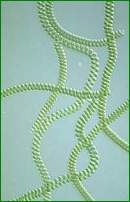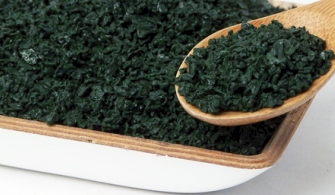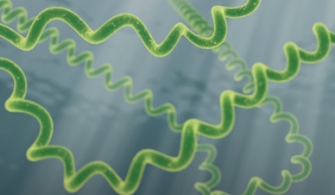Spirulina information
Abha Light grows organic spirulina on its own farm at Wote, Eastern Province. The Spirulina Project is to promote with spirulina as an effective nutritional supplement for children living in economically-challenged communities. We sell Spirulina at our clincs and outlets in powdered form.
Spirulina’s three way action
Unhealthy eating, lack of exercise, smoking, drinking alcoholic beverages and stress, creates a build-up of waste products in our bodies, causing us to feel tired and listless.
 Spirulina quickly puts you back on top. Spirulina works simultaneously on three levels:
Spirulina quickly puts you back on top. Spirulina works simultaneously on three levels:
- Cleansing: Spirulina promotes the body’s natural cleansing processes. You feel fitter, more cheerful, and you have more energy.
- Restoring: Spirulina compensates for deficiencies in the diet and stimulates the metabolism. Your physical condition improves noticeably and you recover faster after exertion.
- Fortifying: Spirulina boosts resistance and activates the body’s natural defence mechanisms. You feel stronger and are better able to cope with the pressures of everyday life.
Because of its cleansing, restoring and fortifying functions, Spirulina has a wide range of applications. It gives you new energy without taking pep-ups and makes you more alert and stable. This is also proven from the experience of countless users.
What Does Spirulina Do?
Spirulina is packed with the proteins, vitafnins and minerals that your body needs in order to be healthy. As a food, Spirulina promotes healing and healthy living by boosting the natural defences of your body, making you stronger and better equipt to fight dieseases.
Spirulina helps detox the body giving the body the power to rejuenate itself. Spirulina is not a synthetic drug. It is 100% natural food and can be used by anyone at anytime to help fight disease or for general health and fitness.
General overview
Spirulina is a type of blue-green algae that is rich in protein, vitamins, minerals, and carotenoids, antioxidants that can help protect cells from damage. It contains nutrients, including B complex vitamins, beta-carotene, vitamin E, manganese, zinc, copper, iron, selenium, and gamma linolenic acid (an essential fatty acid).
Spirulina — like any blue-green algae — can be contaminated with toxic substances called microcystins. It can also absorb heavy metals from the water where it is grown. For these reasons, it is important to buy spirulina from a trusted brand.
Test tube and animal studies suggest spirulina may boost the immune system, help protect against allergic reactions, and have antiviral and anticancer properties.
| How Can You Take Spirulina The dosage of Spirulina depends on the individual need of the user A general guideline: |
|
| Children up to 5 | 1 – 2 grams/day |
| Children over 5 | 2 – 3 gr/day |
| Adults | 3 – 5 gr/day |
| Immune builder | 10 – 5 gr/day |
| Primary Protein | 15 – 20 gr/day |
| Athletes | 20 – 30 gr/day |
| (1 teaspoon = 1.5 grams) | |
Immune Support
A number of animal and test tube studies suggest that spirulina increases production of antibodies, infection-fighting proteins, and other cells that improve immunity and help ward off infection and chronic illnesses such as cancer. However, it has not been tested in people. In one clinical trial that involved humans, another type of blue-green algae called chlorella did not boost the immune response to flu vaccine.
As a Protein Supplement
Amino acids make up 62% of spirulina. Because it is a rich source of protein and other nutrients, spirulina has been used as a nutritional supplement. However, although spirulina contains a certain level of protein, you would need to take very large quantities to see any effect. Other sources of protein, such as nuts, legumes, whole grains, and meat, provide protein in smaller servings.
Allergic Reactions
Animal and test tube studies suggest that spirulina may protect against allergic reactions by stopping the release of histamines, substances that contribute to allergy symptoms, such as a runny nose, watery eyes, hives, and soft-tissue swelling. But whether these preliminary studies will help people with allergies is not known.
Antibiotic-related illness
Although antibiotics destroy unwanted organisms in the body, they may also kill “good” bacteria called probiotics, such as Lactobacillus acidophilus. This can cause diarrhea. In test tubes, spirulina has boosted the growth of L. acidophilus and other probiotics. More research is needed to determine whether spirulina will have the same effect in people.
Infection
Test tube studies suggest that spirulina has activity against herpes, influenza, and HIV. But researchers don’ t know whether it would also work in people.
Oral cancer
In one placebo-controlled study, taking spirulina seemed to reduce a precancerous lesion known as leukoplasia in people who chewed tobacco. Lesions were more likely to go away in the spirulina group than in the placebo group. More research in this area is needed.
Liver disorders
Preliminary evidence suggests that spirulina may help protect against liver damage and cirrhosis (liver failure) in people with chronic hepatitis. Without more research, however, it is impossible to say whether spirulina offers any real benefit.

